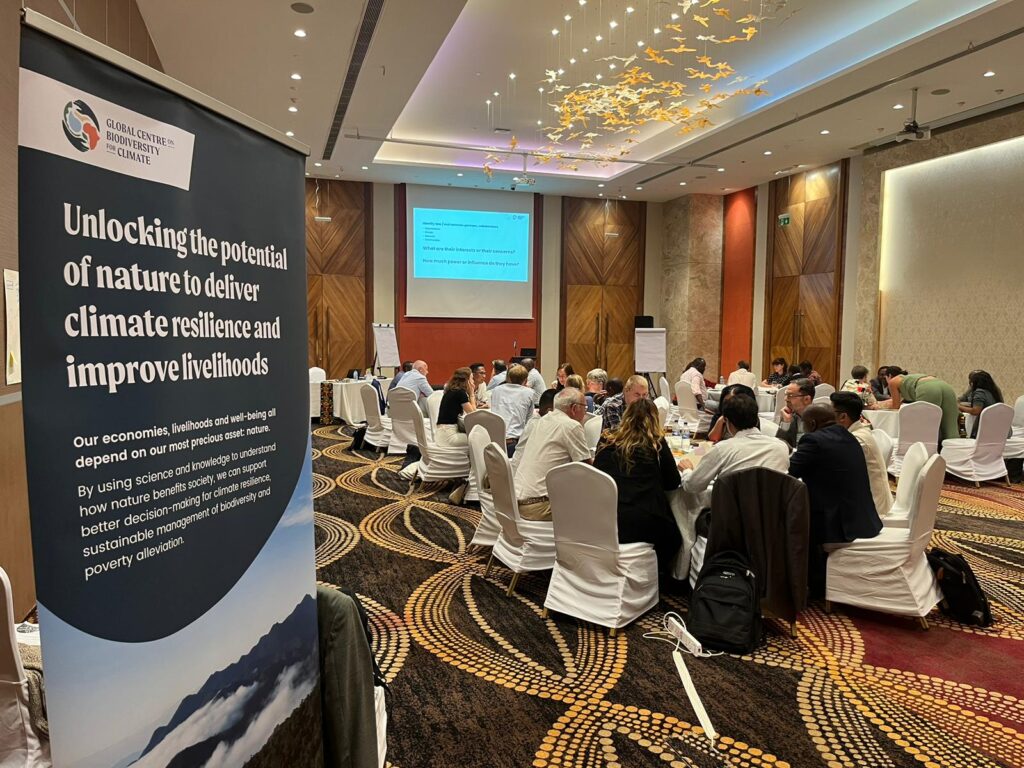GCBC project leaders build connections and share learning at International Environment and Climate symposium
By Samantha Morris, Royal Botanic Gardens, Kew
The Global Centre on Biodiversity for Climate (GCBC) project leaders joined practitioners, researchers and representatives of Indigenous peoples’ organisations from other UK Government environment and climate research programmes in Nairobi for the first International Environment and Climate Research Symposium.
Nature and the environment are the bedrock of our planet, which is facing a triple crisis of climate change, biodiversity loss and pollution. Action is urgently needed to address these critical issues to secure sustainable livelihoods and human wellbeing.
In September, the International Environment and Climate Research Symposium brought together 84 practitioners, researchers and representatives of Indigenous peoples’ organisations from three of the United Kingdom’s largest environment and climate research programmes. Collectively these three programmes manage £50 million across Africa, Asia, and Latin America:
- The Foreign, Commonwealth and Development Office’s (FCDO) Reversing Environmental Degradation in Africa and Asia (REDAA) delivered in partnership with the International Institute for Environment and Development (IIED),
- The UK Research and Innovation’s (UKRI) Equitable nature-based climate resilience in Sub-Saharan Africa Programme, and
- The Department for Environment Food and Rural Affairs’ (Defra) Global Centre on Biodiversity for Climate (GCBC) delivered in partnership with DAI as Fund Management Lead and Royal Botanic Gardens Kew as the Strategic Science Lead.

The Symposium was held in Nairobi, Kenya. It was planned and delivered in partnership, drawing on the unique skills and experience held by each of the three programmes. Sessions were split over several days, with each programme taking time to meet individually, ending with a joint programme day on 19 September.
Connection in action
For the GCBC, connecting and collaborating with other research programmes demonstrates the potential of working to coordinate research to find solutions to climate change that benefit both people and nature.
All 14 GCBC projects that received funding from the first competitive research grant competition attended the Symposium with 28 project leaders and partners in Nairobi.
During the individual day, the GCBC projects were given space to get into the detail, mapping the characteristics of each project with a focus on geography, themes, methods, and partners. This identified a wide range of synergies across a diverse group of research projects. These points of connection will support the GCBC programme to identify areas where we can develop tools, evidence, and resources to deliver greater impact.
The day also addressed Gender Equality and Social Inclusion (GESI), barriers and opportunities to research impact, and strategies for communicating and influencing to amplify research outcomes. Across these areas, projects shared their experiences as they move from existing practice to better practice, exchanging tools and ideas along the way.
During the joint day, participants from all three programmes enthusiastically exchanged practical ideas, concrete solutions and lived experiences to turn knowledge into impact.
Watch the video from the Symposium below:
The rich discussion highlighted several opportunities:
- The value of building trust with communities to genuinely devolve decision making, power, and resources to local actors.
- Sustaining effective stakeholder engagement from the start of interventions and building long term relationships beyond project cycles.
- Constantly evaluating trade-offs and synergies that accompany a systems approach
To carry these ideas, forward participants from all three programmes discussed the potential for ongoing learning exchange, as well as opportunities and pathways for knowledge sharing.
From connection to collaboration
Overall, the Symposium was an energising and inspiring event, an opportunity to build connect and share both within the GCBC programme and with other UK Government programmes.
Work is underway to explore what future connection and collaboration between UK Government programmes could look like, building on the ideas shared by participants at the Symposium.


